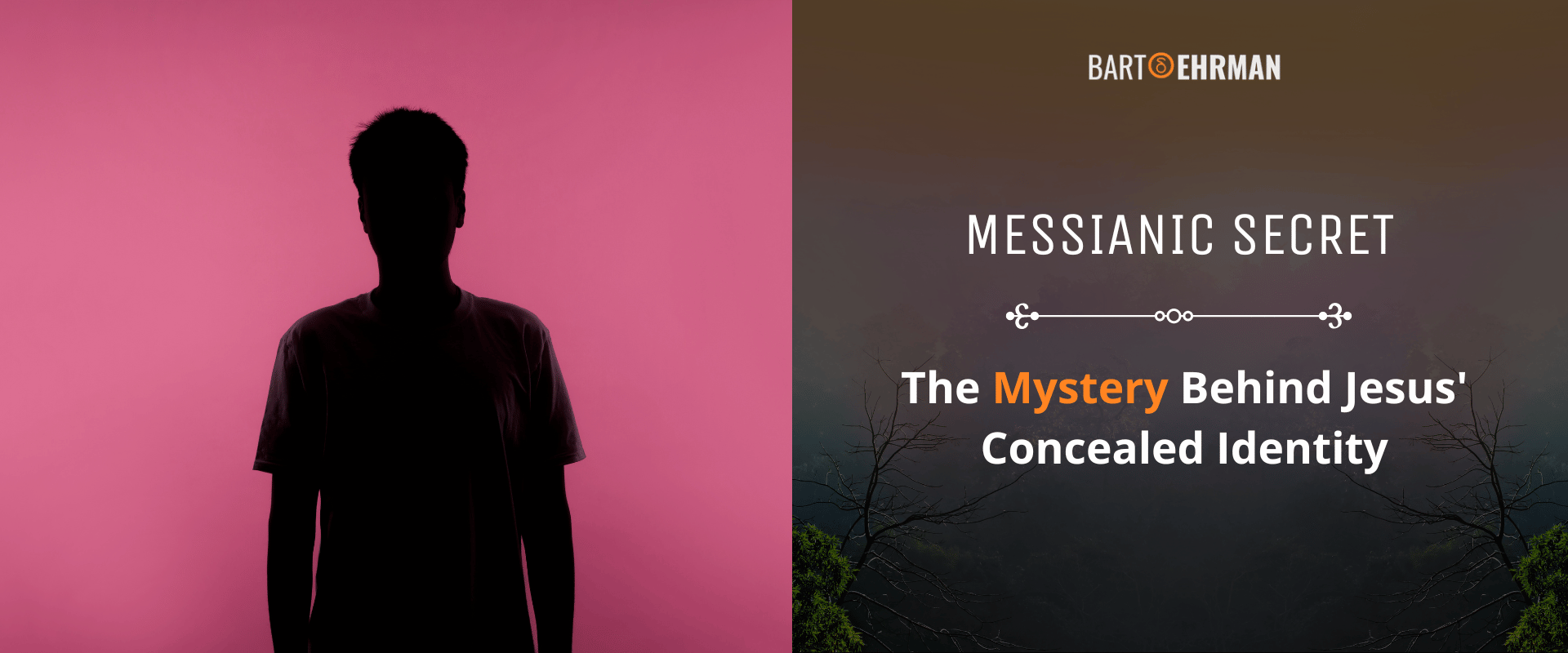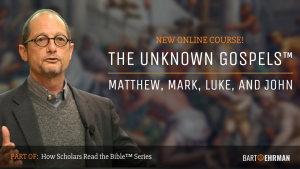Messianic Secret: The Mystery Behind Jesus' Concealed Identity

Written by Marko Marina, Ph.D.
Author | Historian
Author | Historian | BE Contributor
Verified! See our guidelines
Verified! See our editorial guidelines
Date written: September 4th, 2024
Edited by Laura Robinson, Ph.D.
Disclaimer: The views and opinions expressed in this article belong to the author and do not necessarily match my own. - Dr. Bart D. Ehrman
One of my post-graduate professors used to say: “No text is perfect, yet every text hides a world within itself.” It was his clever way of reminding us that even the most obscure or enigmatic historical documents hold untapped treasures.
These texts, no matter how perplexing, are windows into the past, offering glimpses of the author's intentions, societal concerns, and the larger historical context in which they were written. They invite us to step beyond the surface, to explore the subtleties of rhetoric, ideology, and belief that lie beneath the words.
The “Messianic Secret” stands out as one of the most puzzling and fascinating mysteries embedded within the Gospels. This phenomenon, particularly prominent in the Gospel of Mark, has sparked centuries of debate, leaving scholars and theologians alike searching for answers.
Is this secrecy a mere narrative device, a reflection of historical reality, or perhaps a theological puzzle intended to deepen the reader's faith?
As we delve into the concept of the Messianic Secret in Mark, we'll explore its portrayal in the earliest Gospel, compare it with how Jesus is depicted in other Gospels, and examine how both religious tradition and modern scholarship have sought to explain it.
Whether you're a seasoned scholar or just someone who enjoys a good mystery, the Messianic Secret is bound to captivate and challenge your understanding of the Gospels.

The Messianic Secret in Mark: Definition and Explanation
What is the Messianic Secret? In The Routledge Encyclopedia of the Historical Jesus, Neil Elliott notes that the Messianic Secret is used to describe:
(Affiliate Disclaimer: We may earn commissions on products you purchase through this page at no additional cost to you. Thank you for supporting our site!)
“A complex of motifs in Mark’s Gospel that include: Jesus’ commands to demons to be silent and not make him known; his commands to his disciples to “tell no one” about his identity as the Christ, or the Transfiguration vision, until after his resurrection; his performance of miracles 'privately' or secretly, and commands to those he had healed not to make him known – commands that often were disobeyed; and the chronic failure of the disciples to understand either his identity or destiny.”
In the Gospel of Mark, the concept of the Messianic Secret is woven intricately into the narrative, creating a tension between revelation and concealment. Interestingly, those who should recognize Jesus' true identity and mission — his closest disciples such as Peter, James, and John — consistently fail to understand him.
Instead, it's the marginal characters, such as demons and even a Roman centurion, who seem to grasp who Jesus truly is. This irony underlines a key theme in Mark: The profound mystery surrounding Jesus' identity and the paradoxical nature of his mission.
From the outset, Mark's narrative sets the stage for this theme of concealment. Jesus appears as a fully grown man from Nazareth, with no mention of his birth or early life — a significant contrast to Matthew and Luke.
His public ministry begins with his baptism, where, as he emerges from the water, he alone witnesses the heavens opening and the Spirit descending upon him like a dove. A divine voice declares: “You are my Son, whom I love; with you, I am well pleased” (1:11).
Yet, this profound revelation is private, addressed solely to Jesus and not to any onlookers. In other words, this moment of divine affirmation remains concealed from others.
As Jesus begins his ministry, this theme of concealment persists. In one early encounter, a demon identifies Jesus, proclaiming, “I know who you are — the Holy One of God” (1:24). Yet, Jesus immediately silences the demon before casting it out, thus refusing to let the truth of his identity be revealed.
The author of Mark’s Gospel reinforces this motif in 1:34, stating that Jesus “also drove out many demons, but he would not let the demons speak because they knew who he was.” Even when Jesus heals a leper, he sternly instructs the man not to tell anyone about what has happened (1:44).
What’s more striking is the disciples' persistent failure to grasp who Jesus is, despite witnessing his miraculous deeds. After Jesus calms a violent storm, the disciples are left bewildered, asking: “Who is this? Even the wind and the waves obey him!” (4:41).
Later, after the feeding of the 5,000 and Jesus walking on water, the disciples remain astonished, for, as the author notes, “they had not understood about the loaves; their hearts were hardened” (6:52).
Even Peter, who eventually declares, “You are the Messiah” (8:29), is immediately ordered by Jesus not to tell anyone about him. When Peter later struggles to accept Jesus' prediction of his suffering and death, Jesus rebukes him sharply, saying: “Get behind me, Satan! You do not have in mind the concerns of God, but merely human concerns" (8:33).
The pattern in Mark is unmistakable: Jesus consistently silences those who recognize his divine identity and actively prevents people, including his closest followers, from fully understanding who he is.
Do we see the same pattern in other Gospels? Is the Messianic Secret a central part of Matthew’s, Luke’s, and John’s narratives? Let’s take a look!
The Messianic Secret in the Other Gospels
When examining the Synoptic Gospels — Matthew, Mark, and Luke — one can’t help but notice both the striking similarities and critical differences in how they portray Jesus’ identity and mission.
While the concept of the Messianic Secret is a central theme in Mark’s Gospel, this motif is considerably less pronounced in Matthew and Luke. Although traces of the Messianic Secret do appear in these Gospels, it doesn’t play as dominant a role in shaping the narrative as it does in Mark.
For example, a comparative analysis of Jesus’ baptism offers a glimpse into how each Gospel handles the revelation of Jesus’ identity. In Mark, Jesus’ baptism is depicted as a private, almost mystical event (see above).
In contrast, Matthew's account suggests a more public revelation. In Matthew 3:16, the heavens are opened, but there is no explicit statement that only Jesus sees this. Additionally, the heavenly voice speaks in the third person, declaring: “This is my Son, whom I love; with him I am well pleased” (3:17), implying that others, including John the Baptist, may have heard it.
As Richard T. France notes in his Commentary on Mark's Gospel:
“Matthew says not that Jesus saw the heavens opened and the Spirit descending, but that they were opened; and whereas the heavenly voice in Mark is addressed to Jesus in the second person, in Matthew it is a statement about Jesus in the third person, suggesting that John at least was intended to hear it.”
Another notable difference appears in the handling of Jesus' miracles and exorcisms. Mark frequently emphasizes Jesus’ efforts to keep his identity concealed, such as in 1:34, where Jesus “drove out many demons, but he would not let the demons speak because they knew who he was.” However, in Matthew’s parallel passage (4:23), the author omits any mention of Jesus silencing demons.
Instead, Matthew emphasizes Jesus’ widespread ministry: “Jesus went throughout Galilee, teaching in their synagogues, preaching the good news of the kingdom, and healing every disease and sickness among the people”.
When we turn to the Gospel of John, we encounter a dramatically different portrayal of Jesus. In John’s narrative, the concept of a Messianic Secret is almost entirely absent.
Far from concealing his identity, Jesus openly declares his divinity to anyone who will listen. In 6:35, he boldly proclaims: “I am the bread of life”, and in 8:58, he asserts his preexistence with the statement: “Before Abraham was born, I am!” These declarations, combined with numerous other "I am" statements, underscore John’s emphasis on the revelation of Jesus’ divine nature.
So, unlike in Mark, where Jesus’ true identity is often shrouded in mystery and misunderstanding, in John, Jesus leaves little doubt about who he claims to be.
Needless to say, historians aren’t the only ones who have puzzled over this mysterious motif. Religious authorities have long grappled with the Messianic Secret in Mark, and their interpretations — ranging from profound to perplexing — offer us a fascinating glimpse into the theological wrestling match that ensued.
Let’s dive into how the Church, in all its wisdom (and occasional confusion), has made sense of this interesting enigma.
FREE COURSE!
WHY I AM NOT A CHRISTIAN
Raw, honest, and enlightening. Bart's story of why he deconverted from the Christian faith.
Over 6,000 enrolled!
The Religious Explanations for the Messianic Secret
Since the beginning of the last century, Christian scholars have been grappling with the Messianic Secret in Mark in an attempt to reconcile this mysterious motif with the essential dogmas of Jesus' role and identity.
The challenge here is to preserve the image of Jesus as the divine Messiah while explaining why he would so often silence those who recognized him. When examining the approaches of notable Christian scholars, a common thread emerges: A strategic hypothesis.
In his book, The Case for Jesus, Catholic theologian Brant Pitre suggests that Jesus’ secrecy was a deliberate tactic. He writes:
“Whole books have been written attempting to explain what scholars have come to refer to as 'the Messianic secret'. But the best explanation is that he is biding his time. Because the truth about his identity is so potentially explosive, Jesus keeps it as secret as possible until the time is right to bring his mission to a climax.”
Pitre’s interpretation suggests that the historical Jesus was fully aware of the implications of his identity and chose to reveal it gradually, waiting for the most opportune moment to fulfill his mission.
Protestant scholar Craig Keener echoes this sentiment in The Historical Jesus of the Gospels, where he notes:
“At least one important reason for allowing claims of his messiahship only toward the end of his ministry was a matter of practical strategy. Messianic acclamations could (and did) lead the authorities wrongly to classify Jesus as a revolutionary and seek his execution... Jesus presumably delays his martyrdom until the appropriate time and place (Passover in Jerusalem).”
So, according to Keener, Jesus’ careful management of his public image was a way to control the timing of his death and ensure that his crucifixion would align with the Passover in Jerusalem.
When a Modern Messiah Met Tragedy: The Story of David Koresh
The claims of Messianic identity didn't end with Jesus. In fact, throughout history, various religious leaders have stepped forward with extraordinary declarations of their divine or messianic roles. One of the most infamous figures in recent history is David Koresh, born Vernon Wayne Howell.
Koresh, the leader of the Branch Davidians, claimed to be the final prophet and the Lamb of God as described in the Book of Revelation. He convinced his followers that he was the chosen one to unlock the mysteries of the Bible and lead them to salvation. Koresh's charismatic leadership and apocalyptic teachings culminated in the tragic Waco Siege of 1993. The 51-day standoff between the Branch Davidians and federal authorities ended in a devastating fire that claimed the lives of 76 people, including Koresh himself.
Adding to this theological discourse, Joseph Ratzinger (Pope Benedict XVI) offers a similar interpretation in his book Jesus of Nazareth.
Reflecting on Jesus' rebuke of Peter following Peter's declaration that Jesus is the Messiah, Ratzinger notes that Jesus “forbids the disciples to speak openly of this confession [of Peter], given that it would undoubtedly have been misinterpreted in the public climate of Israel and would necessarily have led on one hand to false hopes in him and on the other hand to political action against him.”
For Ratzinger, the secrecy was a protective measure, safeguarding both Jesus’ mission and the expectations of the people. By maintaining control over his identity, Jesus prevented political and social forces from derailing his divine plan.
These explanations share a common feature: They accept the historical authenticity of the Messianic Secret in Mark and then interpret it through a theological lens.
In their view, Jesus knew from the outset what his mission entailed — suffering, death, and resurrection — and his insistence on secrecy was a way to ensure that this mission unfolded according to divine timing.
With that said, we’ll now turn to how critical scholars have interpreted the Messianic Secret. Spoiler alert: Their explanations might not align with the traditional view, but they sure do add some intriguing layers to the mystery!
The Messianic Secret in Mark: Scholarly (Historical) Interpretations
The first historian to bring significant attention to the Messianic Secret in Mark was William Wrede in 1901, who argued that this theme wasn’t authentic history but a deliberate literary creation.
Wrede observed that the Messianic Secret consistently appears in Mark's editorial material — those narrative connections that the evangelist used to weave independent stories from the oral tradition into a cohesive Gospel.
As Keith Nickle explains in The Synoptic Gospels, this motif is primarily located “in the narrative connectors with which Mark bound his story together. This would suggest that most of them were not included in the independent stories of the oral tradition. Mark himself was the one largely responsible for the prominence that the ‘messianic secret’ motif had in his Gospel.”
So, how should historians interpret this? Wrede proposed that the Messianic Secret was a solution to a historical problem: the cognitive dissonance between the early Christian proclamation of Jesus as the Messiah and the lack of any clear messianic claim by Jesus himself during his lifetime.
Wrede believed that Jesus never actually declared himself to be the Messiah, and, therefore, the Gospel of Mark presents a narrative where Jesus acknowledges his identity but commands silence. This way, Mark retroactively justifies why Jesus' messiahship wasn’t recognized until after his death and resurrection.
However, while Wrede’s hypothesis was groundbreaking, it hasn’t gone unchallenged. For instance, I would argue that the historical Jesus did indeed see himself as a Messiah-like figure chosen by God to rule in the forthcoming Kingdom on Earth (see Bart D. Ehrman’s excellent podcast here).
Yet, I agree that the Messianic Secret in Mark serves primarily as a literary device (Wrede argued that Mark took this device from the earlier tradition and developed it further; others believe that this literary device is, first and foremost, Mark’s creation).
Here, it’s important to distinguish between Jesus' perceived messianic role and the later theological developments surrounding his divine identity. Like many critical scholars today, I don’t believe that the historical Jesus ever claimed to be divine — a claim that would have been blasphemous to a devout Jew.
If you're curious to delve deeper into this discussion, I highly recommend Bart D. Ehrman's excellent online lecture, Did Jesus Think He Was God? A Closer Look at the Evidence!
Over the years, scholars have built upon Wrede’s foundation, offering various interpretations of the Messianic Secret. Some, such as Donald Michie and David M. Rhoads, focus on the negative portrayal of the original disciples in Mark's Gospel — especially Peter and James.
They suggest that this depiction could be linked to the tensions between these disciples and the Apostle Paul, as reflected in Paul's letters. According to this view, the author of Mark, possibly a supporter of Paul, might have intentionally portrayed Paul’s rivals in a less favorable light to bolster Paul’s theological position.
Keith Nickle, on the other hand, offers a different perspective. He suggests that the Messianic Secret motif may have served pastoral and cross-cultural purposes for Mark's community. As Nickle explains:
“The 'messianic secret' motif helped Mark deal with the problem that members of his community were having when they tried to use the stories of Jesus. It was an additional antidote to the potential danger that Gentiles might misunderstand those stories as picturing Jesus as a Hellenistic 'divine man'.”
By emphasizing secrecy, Nickle argues, Mark could insist that Jesus’ identity couldn’t be fully understood through his miracles or exorcisms alone — only in the context of his suffering, crucifixion, and resurrection could Jesus be truly recognized as the Messiah.
Interestingly, in contrast to Nickle’s thesis, Heikki Räisänen offers an opposing view. In his book Messianic Secret in Mark’s Gospel, Räisänen interprets the Messianic Secret as a literary device through which the author of the Gospel “defends (unjustifiably at the historical level) his Hellenistic viewpoint” regarding the Mosaic Law and the mission to the Gentiles.
While exploring these issues in greater depth would be fascinating, it falls beyond the scope of this article. Besides, when it comes to scholarly debates on complicated issues like this one, it seems that the only thing scholars can consistently agree on is that they rarely agree on anything.
In any case, these interpretations are all intriguing and contribute valuable insights into the complex nature of Mark's Gospel. However, pinpointing the precise origin and purpose of the Messianic Secret remains elusive. What is clear, though, is that this motif was likely not a central part of the earlier oral traditions Mark used as his sources.
Instead, it appears to be a post-Easter literary device crafted either by a storyteller or the author of the Gospel to shape the narrative of Jesus' life, death, and resurrection in a way that made theological sense to his audience.
In the end, whether the Messianic Secret is a product of theological necessity, a reflection of early Christian disputes, or a narrative tool designed to deepen the mystery surrounding Jesus, one thing is certain: Mark knew how to keep a secret. And even after a century of scholarly work, we’re still trying to crack the case.
So, hats off to Mark (or whatever his name was!) — the enigmatic storyteller from the ancient world, who knew that sometimes the best way to reveal the truth is to keep it hidden.

Conclusion
The Messianic Secret remains one of the most intriguing and debated themes in New Testament studies. From its portrayal as a literary device used to build narrative tension, to its theological implications within early Christian communities, the theme has invited a wide array of interpretations.
Religious scholars, both Catholic and Protestant, have often viewed the Messianic Secret in Mark as a strategic element in Jesus' mission, ensuring the correct timing of his revelation as the Messiah and protecting his divine plan from premature disruption.
On the other hand, critical scholars, starting with William Wrede, have approached the Messianic Secret with a more historical-critical methodology, questioning its origins and purpose within the Gospel.
While the precise intent behind the Messianic Secret may remain elusive, its enduring presence in scholarly discourse underscores its importance in understanding the complex portrayal of Jesus in the earliest Gospel.

